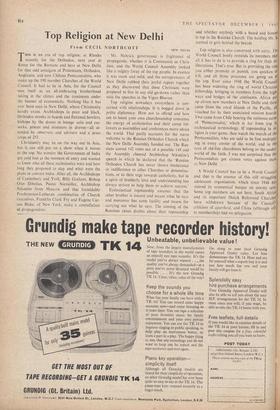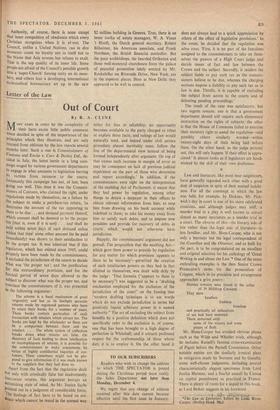Top Religion at New Delhi
From CECIL FT HIS is an era of top religion; at Rhodes recently for the Orthodox, next year at Rome for the Romans and here at New Delhi for that odd amalgam of Protestants, Orthodox, Anglicans, and now Chilean Pentecostalists, who make up the 198 member Churches of.the World Council. It had to be in Asia, for the Council .sees itself as an all-embracing brotherhood taking in the climes and the continents under the banner of ecumenicity. Nothing like it has ever been seen in New Delhi, where Christianity hardly exists. Archbishops in puce and black, Orthodox monks in beards and flattened bowlers, bishops by the dozen in lounge suits and cas- socks, priests and ministers in droves—all at- tended by observers and advisers and a press corps of 257.
Christianity may be on the way out in Asia, but it can still put on a show when it moves to the top. No wonder the Government of India got cold feet at the moment of entry and wanted to know who all these ecclesiastics were and how long they proposed to stay and what were the plans to convert India. After all, the Archbishops of Canterbury and York, Billy Graham, Bishop Otto Dibelius, Pastor Niemoller, Archbishop Nikodim from Moscow and that formidable Presbyterian-Lutheran combination of Church executives, Franklin Clark Fry and Eugene Car- son Blake, of New York, make a constellation of propagandists. Mr. Nehru's government is frightened of propaganda. whether it is Communist or Chris- tian, and the World Council Assembly looked like a mighty foray of the top people. In essence it was meek and mild, and the entrepreneurs of New Delhi rubbed their joyful rupees together as they discovered that these Christians were prepared to live in any old go-down rather than miss the speeches in the Vigan Bhavan.
Top religion nowadays everywhere is con- cerned with relationships. It is bogged down in polite diplomacy. How not to offend and how not to boost your own churchmanship consumes the energy of ecclesiastics and their camp fol- lowers as assemblies and conferences move about the world. That partly accounts for the warm welcome to the Russian Orthodox Church which the New Delhi Assembly handed out. The Rus- sians scored 142 votes out of a possible 149 and the AsseMbly cheered Archbishop Nikodim's speech in which he declared that the 'Russian Orthodox Church has never shown intolerance or indifference to other Churches or denomina- tions, or to their urge towards catholicity, but in a spirit of brotherly love and understanding has always striven to help them to achieve success.'
Ecclesiastical topmanship assumes that the other brother is sincere and means what he says and moreover has some facility and means for carrying out what he says. The Coming of the Russians raises doubts about their topmanship and whether anybody with a beard and bonne' 'Is top in the Russian Church. The balding Mr. K seemed to grin behind the beards.
Top religion is also concerned with unity. The World Council busily reminds its members that all it has to do is to provide a ring for their de' liberations. That's true. But in providing the ring you either promote or punish, you quicken at kill, and all those processes are going on al the top. Ever since 1948 the World Council has been widening the ring of world Christian fellowship, bringing in members from the high' ways and hedges of the continents. Africa put up eleven new members at New Delhi and three came from the coral islands of the Pacific, all vouched for by their associated mission boards. Two came from Chile bearing the ominous name of 'Pentecostalist,' which is far from top in ecclesiastical terminology. If topmanship in re' ligion is your game, then watch the march of the Pentecostalists, who are said to be fast multiplY' ing in every corner of the. world, and in the eyes of old-line churchmen belong to the under. world of the faith. I was not surprised that the Pentecostalists got sixteen votes against thefts at New Delhi A World Council has to be a World Council and that is the essence of this still struggling adolescent organisation, which since 1948 has steered its ecumenical barque on stormy seas. Some top members are not here. South /Vries and its important Dutch Reformed Churches have withdrawn because of the Council's criticism of apartheid, and China (although still, in membership) had no delegation. Authority, of course,. there is none except that inner compulsion of obedience which every Christian recognises when it is absent. The Council, unlike a United Nations, can in dire moments count on loyalty not to itself but to the Name that Asia reveres but refuses to exalt. That is the top quality of its inner life. Some People are afraid of the Council's possible growth into•a 'super-Church' forcing unity on its mem- bers, and others fear a developing international ecclesiastical bureaucracy set up in the new $2 million building in Geneva. True, there is an inner troika of astute managers, W. A. Visser 't Hooft, the Dutch general secretary, Robert Bilheimer, his American associate, and Frank Northam, the British financial controller. But the puce archbishops, the bearded Orthodox and those well-moneyed churchmen from the palace of peaceful promotion lately erected by Mr. Rockefeller on Riverside Drive, New York, are in the topmost places. Here at New Delhi they appeared to be well in control.







































 Previous page
Previous page